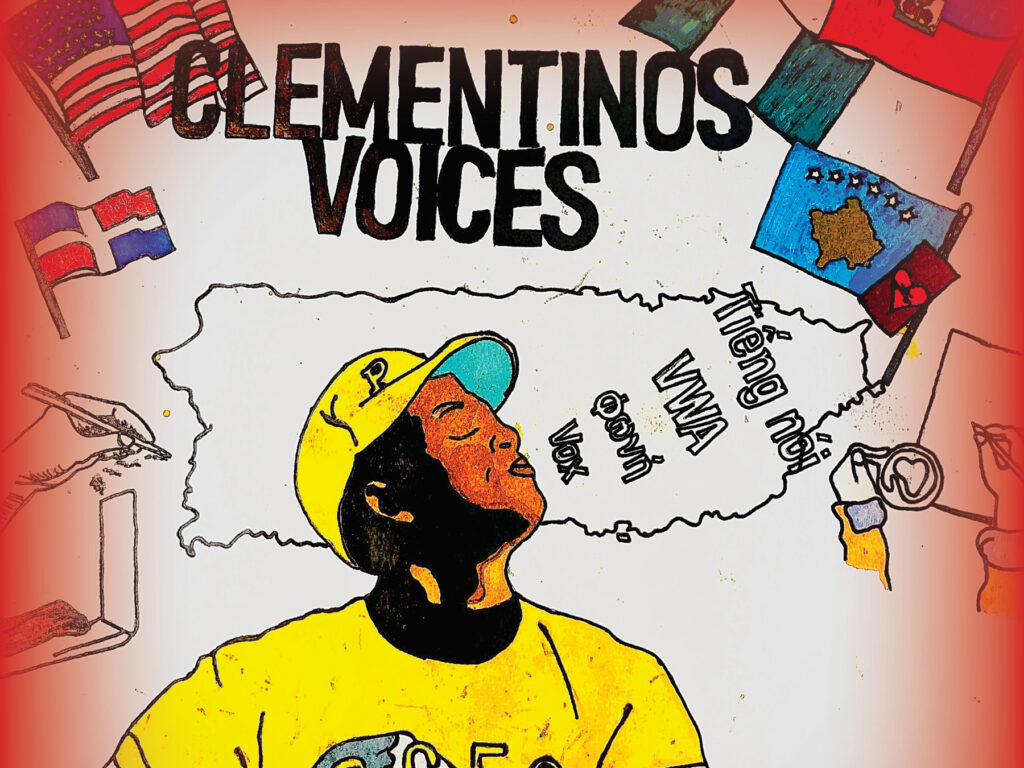By Aminah Pilgrim
TEACHING HISTORY IN BROCKTON CLEMENTE COURSE
As a classroom community, our capacity to generate excitement is deeply affected by our interest in one another, in hearing one another’s voices, in recognizing one another’s presence.
—bell hooks, Teaching to Transgress: Education as the Practice of Freedom
The 2023 Brockton Clemente graduation was our most formal ceremony to date. Ten students completed the course, attending classes both virtually and in person. It was the first celebration held in person since the end of the COVID-19 quarantine period. Graduation took place at the Brockton Public Library, our home inside the city. Our program administrator decorated the hall beautifully and set up tables for guests and a photo installation for the graduates to take pictures of themselves wearing their caps and stoles. The majority Haitian immigrant cohort and their guests were treated to an elaborate meal catered by a Haitian chef. All were treated to a festively decorated cake that was adorned with the words “Congratulations Class of 2023!” The graduation speakers included the program codirectors, a student representative, a prominent pastor and community leader, the library director, and the city’s mayor. Each highlighted the resiliency of the students who pursued their education during the end of quarantine, despite the traumas of the previous two years of the pandemic. It was clearly they, not the pomp and circumstance of the event, that was the most exceptional thing.
On the first day of my history course for each Brockton Clemente cohort, I introduce myself and my philosophy of teaching. I tell them that one objective of the course is to create community and that another objective is to create opportunities that foster personal growth. My wish is that the students will find themselves in the pages of the history texts, in the stories of ordinary people who made change. The principle of Sankofa guides the course. Sankofa is the name of a 1993 film on US slavery, written and directed by Ethiopian filmmaker Haile Gerima. We watch part of the historic film in class. The film launched a movement within Africana studies. The word (and its symbol) comes from the Twi language of the Akan people of Ghana, West Africa. Translated simply, it means “go back and fetch it” (or as I explain it to students, reclaim your past to power your future).
Armed with an understanding of Sankofa, we set forth on a journey to explore the multicultural and multilingual history of the United States as colearners, as coteachers, and as one community. In oral presentations, students are encouraged to make connections between their heritage country and US history. The results are transformative as each Clementino teaches and their peers demonstrate interest in the material. In the words of bell hooks, they experience “interest in one another, in hearing one another’s voices, in recognizing one another’s presence.” Encouragement becomes contagious and momentum building. It is often a bit easier to generate excitement in a class with these conditions.
There are two Sankofa symbols. Each one is a powerful metaphor for the work of the Brockton Clemente history course. One depicts the two sides of a heart turning inward as if to face one another. I explain this as the two realms in which history exists—past and present—both necessary for a critical understanding of the subjects examined. The other symbol is of a bird with its head turned all the way back, looking back with an egg in its mouth—symbolizing hope and a future pregnant with possibilities. I tell students this sends a message that history examined can provide a blueprint for some of the pathways toward liberation and social justice.
As the course unfolds and we explore many of the topics in our textbook, Ronald Takaki’s A Different Mirror, there is an expectation that we connect history with current events, and connect the local with the global (US history with the histories of the countries our diverse students hail from). Students are also nudged to write about or discuss their own current challenges and to look to the history of individuals or organizations that resolved to create lasting personal or cultural change. Starting the class in this way, with an African symbol, using a word from the Twi language, also signals to the class that we reject the “hegemony of English.” This is a brave space in which they can bring their whole selves, recovering unknown parts of history and reframing their present and future selves.
In Brockton in particular, this makes sense. Massachusetts’s first majority Black city, the residents include populations of African and Caribbean immigrants such as the Haitians in the class of 2023, among others (Cabo Verdean, Somalian, Angolan, Jamaican, Barbadian, etc.). The Sankofa concept and symbols resonate with their own cultural values, creating a familiar context, one that evokes joy and affirmation, one in which powerful learning can take place against a backdrop of acceptance. In their respective, individual Sankofa journeys, our students have overcome tremendous obstacles to arrive at the Clemente course—personal and collective traumas, loss of loved ones, addiction, being unhoused, and food insecurity, just to name a few. I remind them that the things they overcame are “receipts” for the strength they carry within them. They are invited to bring that strength and perspective to the study of history (and the other humanities classes in the program). In the classroom community, we can be present with one another and cocreate a healing, transformative experience within education.


